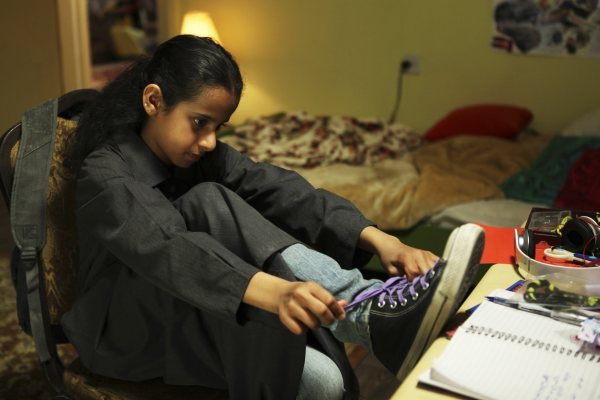Gone Home
(2013):
Designed by Steve Gaynor. Developed by
the Fullbright Company. Original music
composed by Chris Remo. Also featuring
music by Heavens to Betsy and Bratmobile.
Said protagonist is Kaitlin
Greenbriar, a college girl who has just completed a year abroad in Europe. The game begins around midnight, in the middle
of a terrible thunderstorm, right after Kaitlin arrives in a taxi from the
airport. Before entering her family’s
mansion of a house, Kaitlin finds a strange note from her sister (named Sam) apologizing
that she can’t be there to greet her, and asking that she a) not look for clues
as to where she’s gone, and b) not breathe a word to Mom and Dad about anything
she does find. She opens the door
slowly, and the lights turn on to reveal the grand front hall of an utterly
deserted house. Not only is the house
abandoned, but several of the rooms are in disarray, as if someone (or several
persons) were in a hurry to leave.
Gone
Home is a wonderful example of perfectly meshed story and gameplay,
centered on very basic point-and-click exploration. The setup perfectly fuses together player and
character in shared ignorance. Neither
we nor Kaitlin have any idea where her family might be, and why her sister
would leave such a cryptic note, so the only logical way for us to find out why
is to systematically search the house for clues. In another brilliant twist, we soon learn
that the Greenbriars moved into this house after Kaitlin left for Europe; this
is attested to by the mounds of still-unopened boxes that fill the closets and
basement. This means that Kaitlin is just
as ignorant of the size and layout of the house as we are (and it’s a big, big
house), so the only way to find the clues we need is to check each and every room
to learn where everything is. It’s also
a convenient explanation for why Kaitlin doesn’t already have keys to the
house’s several locked doors.
There is no clear linear progression
the player is required to follow, although the locked doors occasionally prod
the player in a particular direction, so most of games’ progress and speed
comes down to whichever area the player feels like exploring in a given moment,
and how obsessively they want to pick through each room (although even the
slowest of players, like me, probably won’t need more than 3-4 hours to
complete it). We learn a few things
about Kaitlin and her family that she would obviously know already, but those
details are incidental and unimportant- the real question driving the game is
what we don’t know, and it is through the exploration gameplay that he answers
are slowly revealed to us.
These revelations come in the form
of a collection of brief audio logs left behind by Sam, each of which are
“discovered” when Kaitlin enters various parts of the house. It is possible to find the logs
non-chronologically, and thus jump around in the narration a bit, but most of
them are placed fairly strategically throughout the house so that the player is
most likely to find them in “proper” narrative order. While this does seem to contradict Sam’s
desire that no one find out what happened to her, it’s a minor complaint, a
slight violation of the laws of realism necessitated by this being, after all,
a game. Of course, it’s also possible
that Sam placed the logs there on purpose, knowing full well that telling her
sister to not look for her would work about as well as commanding her to prance
naked through the rain (and the conclusion of the game (no spoilers) does seem
to confirm this interpretation, albeit indirectly).
This audio-only story revealed
through the logs is what really makes Gone
Home shine, and what elevates it to the level of true storytelling art. I would love to delve into the specifics of
the family life that Sam’s narration (excellently performed by Sarah Robertson) illuminates piecemeal, but to do so would utterly spoil the entire
affair, along with some of the intriguing surprises it contains. What unfolds as we explore the house is a
story primarily about youth, rebellion, love, and friendship, but which also
touches on marital fidelity, family dynamics, and the stress of failing to meet
others’ expectations. I have never felt
so invested and interested in the story of a character you never even see, be
it in a video game, movie, or play. On
top of its fantastic story and writing, however, the game creates an incredibly
effective and unnervingly scary atmosphere without even having to try very
hard- exploring a massive, strange,
dark, and empty house while thunder crashes outside every 5 minutes is just
plain creepy, even if you know there’s no boogey man waiting around each
hallway corner.
Gone
Home was one of the most fascinating, engrossing, and engaging gaming
experiences I have ever had, on par with Portal
and the Civilization series, although
I can’t yet say if it will have the same level of replay value for me as both
of those titans do. That’s beside the
point, however. Even if you only play
this gem once, I am confident you won’t forget it for a long, long time. I cannot recommend this game enough. To anyone reading this who still doubts that
video games are the next form of storytelling art, or that voice acting isn’t
“real” acting, I would like to kindly direct your attention to Gone Home.
-Noah
Franc


